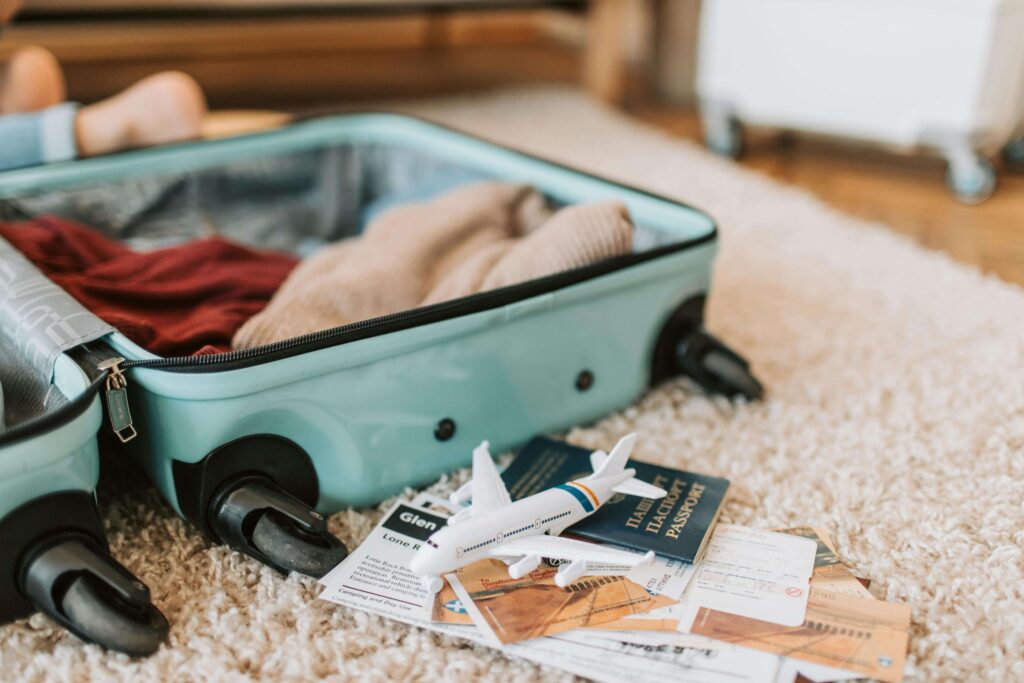This post contains affiliate links. If you purchase through these links, I may earn a commission at no extra cost to you.

Studying abroad is one of life’s most exciting adventures—new cultures, independence, and unforgettable experiences await. But along with the excitement comes new responsibilities, including taking care of your sexual health abroad. Whether you’re planning a semester in Europe, a year in Asia, or any international experience, this comprehensive guide will help you stay healthy, make informed decisions, and navigate healthcare systems far from home.
Why International Students Need Special STD Prevention Strategies
Study abroad STD prevention involves unique challenges you won’t face at home. You’re navigating unfamiliar healthcare systems, potentially different cultural attitudes toward sexual health, possible language barriers, and the excitement of new experiences that might influence decision-making.
Research shows that students studying abroad may engage in riskier sexual behaviors than they would at home, partly due to the sense of anonymity and freedom that comes with being in a new place. Add in factors like alcohol, parties, and the “what happens abroad stays abroad” mentality, and it’s clear why sexual health abroad requires extra attention.
Get Tested TodayBefore You Leave: Sexual Health Preparation for Study Abroad
Get Comprehensive Testing at Home
Start your journey with a clean slate. Get tested for all major STDs before departure, including:
- Chlamydia and gonorrhea
- Syphilis
- HIV
- Herpes (HSV-1 and HSV-2)
- Hepatitis B and C
Having recent test results gives you a baseline and peace of mind as you begin your international experience.
Research Your Destination’s Healthcare System
Knowledge is power when it comes to sexual health abroad. Before you leave:
- Identify local healthcare providers and clinics
- Research STD testing availability and costs
- Understand insurance coverage for sexual health services
- Learn basic medical vocabulary in the local language
- Download translation apps for medical emergencies
Stock Up on Protection
Pack smart for sexual health abroad. Consider bringing:
- Condoms from home (familiar brands and proper sizing)
- Personal lubricant
- Any prescription medications you’re currently taking
- Emergency contraception if legally available in your home country
Different countries have varying availability and quality of sexual health products, so being prepared helps ensure you have what you need.
Understanding Regional STD Risks for International Students
Europe: Study Abroad STD Prevention Considerations
- Generally excellent healthcare systems with accessible STD testing
- Higher rates of certain STDs in some Eastern European countries
- Varying attitudes toward sexual health across different cultures
- Good availability of protection and contraception in most countries
Asia: Sexual Health Abroad Challenges
- Wide variation in healthcare quality and availability
- Cultural taboos around sexual health may limit open discussion
- Different STD prevalence patterns compared to Western countries
- Language barriers may complicate healthcare access
Latin America: International Student Health Considerations
- Variable healthcare infrastructure depending on location
- Cultural attitudes toward sexuality may affect healthcare access
- Some regions have higher rates of certain STDs
- Availability of sexual health resources varies significantly
Africa and Middle East: Unique Considerations
- Healthcare access varies dramatically by country and region
- Strong cultural and religious influences on sexual health discussions
- Limited availability of certain sexual health services
- Potential legal restrictions on sexual behavior in some countries
Navigating Cultural Differences in Sexual Health Abroad
More reading: Can You Get an STD from Kissing?
Communication and Consent Across Cultures
Understanding local dating and relationship norms is crucial for both safety and respect:
- Research cultural attitudes toward casual relationships
- Learn how consent is communicated in local contexts
- Understand legal drinking ages and alcohol culture
- Be aware of local laws regarding sexual behavior
Healthcare Communication
Language barriers can complicate sexual health abroad:
- Learn key medical terms in the local language
- Use translation apps or bring a trusted friend if needed
- Research whether English-speaking healthcare is available
- Understand cultural attitudes toward sexual health discussions with medical providers
Practical STD Prevention Strategies While Studying Abroad
Safe Practices for International Students
Consistency in prevention is key to sexual health abroad:
- Always use barrier protection (condoms, dental dams)
- Limit alcohol consumption that might impair judgment
- Get to know partners before sexual activity when possible
- Avoid sharing needles for any purpose, including tattoos or piercings
- Be extra cautious with medical or dental procedures in areas with questionable hygiene standards
Building a Support Network
Having trusted people around you supports sexual health abroad:
- Connect with other international students
- Build relationships with local students who can provide cultural context
- Identify LGBTQ+ friendly resources if applicable
- Know who to contact in case of emergency or health concerns
Accessing STD Testing and Treatment While Studying Abroad
Finding Healthcare Providers
Locating sexual health services abroad:
- Contact your study abroad program for healthcare recommendations
- Research international clinics that serve English-speaking patients
- Look for university health centers with experience treating international students
- Identify 24-hour emergency medical facilities
Understanding Costs and Insurance
Financial planning for sexual health abroad:
- Review your health insurance coverage for international care
- Research costs for STD testing in your destination country
- Consider purchasing additional travel health insurance
- Budget for potential out-of-pocket sexual health expenses
What to Expect in Different Healthcare Systems
Preparation helps navigate unfamiliar medical systems:
- Some countries require referrals for specialist care
- Testing procedures and timelines may differ from home
- Privacy laws and patient rights vary by country
- Treatment protocols might be different from what you’re used to
Emergency Situations: Sexual Health Crises Abroad
More articles: The STD That Spreads Without Sex
Get Tested TodayIf You Think You’ve Been Exposed to an STD
Act quickly and don’t panic:
- Seek medical attention as soon as possible
- Contact your study abroad program’s emergency support
- Research post-exposure prophylaxis (PEP) availability if HIV exposure is suspected
- Document everything for insurance and follow-up care
Sexual Assault Resources
Know your resources before you need them:
- Research local crisis hotlines and support services
- Understand reporting procedures and victim rights
- Identify medical facilities experienced in sexual assault cases
- Know how to contact your embassy or consulate for support
Communication with Home
Staying connected supports your sexual health abroad:
- Keep trusted family or friends informed about your health status
- Research international calling options for healthcare consultations
- Consider telemedicine options with providers from home
- Plan for prescription medication needs and refills
Technology and Sexual Health While Studying Abroad
Dating Apps and Online Safety
Digital dating abroad requires extra caution:
- Research which dating apps are popular and safe in your destination
- Be extra cautious about meeting strangers in unfamiliar places
- Share your location with trusted friends when meeting new people
- Understand local laws regarding online interactions
Health Apps and Resources
Technology can support sexual health abroad:
- Download translation apps with medical terminology
- Research local health and emergency contact apps
- Consider telehealth consultations with providers from home
- Use period and fertility tracking apps if relevant to your health management
Maintaining Long-term Sexual Health During Extended Study Abroad
Regular Testing Schedules
Consistency matters for sexual health abroad:
- Establish a testing routine based on your activity and risk factors
- Don’t skip regular check-ups just because you’re in a new country
- Plan testing around school breaks when you might travel
- Keep detailed health records for continuity of care
Relationship Management
Long-distance relationships require special consideration:
- Discuss sexual health expectations with partners at home
- Be honest about any new relationships or experiences abroad
- Plan for testing before reuniting with long-term partners
- Address jealousy and trust issues that might arise
Preparing for Your Return Home
Re-entry Health Considerations
Complete your health journey responsibly:
- Get comprehensive STD testing before returning home
- Gather medical records from any treatment received abroad
- Plan for potential quarantine or health screening requirements
- Schedule follow-up appointments with your home healthcare providers
Sharing Your Experience
Help future students with your knowledge:
- Share resources and recommendations with your study abroad program
- Contribute to peer guides and student forums
- Be honest about challenges and successes in managing sexual health abroad
- Consider mentoring future international students
Your Sexual Health Journey Starts Before You Leave
Taking charge of your sexual health abroad begins with preparation, continues with smart decision-making during your experience, and concludes with responsible re-entry planning. Remember that seeking sexual health care is a normal, important part of taking care of yourself—whether you’re at home or halfway around the world.
Getting ready to study abroad or concerned about your sexual health after international travel? Shield STD Guide provides comprehensive pre-departure testing, educational resources for international students, and confidential support for any sexual health concerns. Our expert-reviewed guides and accessible testing options help you start your adventure with confidence and return home with peace of mind.
[Prepare for Your Study Abroad Adventure with Shield STD Guide →]
Frequently Asked Questions
Is STD testing more expensive when studying abroad?
Costs vary dramatically by country. Some European countries offer free or low-cost testing, while private clinics in other regions might be expensive. Research costs beforehand and consider travel health insurance that covers sexual health services.
Should I tell my study abroad program if I need STD testing?
Most programs have confidential health services and can help you find appropriate care. They’re experienced with student health needs and want you to stay safe. However, your medical information remains private unless you choose to share it.
Can I get the same STD treatments abroad that I would at home?
Most standard STD treatments are available internationally, though brand names and formulations may differ. Some newer or specialized treatments might not be available in all countries. Research treatment availability for any ongoing conditions before departure.
What if I’m studying abroad in a country where sexual health resources are limited?
Plan ahead by researching nearby countries with better healthcare access, consider telehealth consultations with providers from home, and pack extra supplies. Some international clinics specifically serve expatriates and travelers with Western-standard care.
How do I handle STD prevention if I’m studying abroad in a conservative country?
Research local laws and cultural norms carefully. Purchase protection before arrival, be discreet about sexual health needs, and identify international clinics or diplomatic health services if local options are limited. Your safety and health are priorities.
Should I get tested for different STDs when studying abroad in certain regions?
Some regions have higher prevalence of specific STDs, but standard comprehensive testing is usually appropriate regardless of location. Discuss regional risk factors with your healthcare provider before departure and upon return.
Can I use my home country’s prescription medications while studying abroad?
Research medication legality in your destination country, as some prescriptions legal at home might be restricted abroad. Carry medications in original containers with prescriptions, and research local equivalents in case you need refills.
What should I do if I need emergency contraception while studying abroad?
Research availability and legal status before departure, as emergency contraception laws vary widely. Some countries require prescriptions, others sell it over-the-counter, and some restrict access entirely. Plan accordingly and know your options.
Get Tested TodayAdditional Resources
World Health Organization – International Health:
https://www.who.int/health-topics/international-health-regulations
International Association of Student Affairs and Services:
https://www.iasas.global/
This article is for educational purposes only and does not constitute medical advice. Always consult healthcare professionals for personalized medical guidance, and check with your study abroad program for specific health and safety requirements.
This content is for educational purposes only and should not be taken as medical advice. Always consult a qualified healthcare provider with any questions you may have about STDs, sexual health, or medical conditions. If you think you may have an STD, contact a doctor or a local clinic right away.
